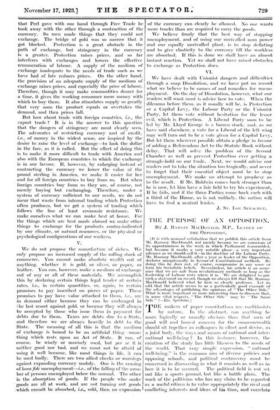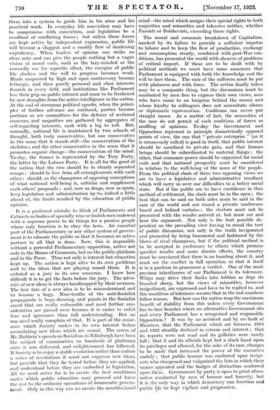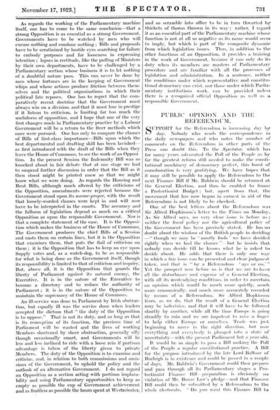THE PURPOSE OF AN OPPOSITION.
Br J. IZ 31SAY MACDONALD, M.P., LEADER OF THE OPPOSITIO.
It is Will Unusual satisfaction that we publish this article from Mr. Ramsay MacDonald, not merely because we arc conscious of its opportuneness in the week in which Parliament reassembled, but because it marks a very notable phase—a very important advance as we should call it—in the doctrine of the Labour Party. Mr. Ramsay MacDonald, after a year as leader of the Opposition, declares unequivocally in favour of Constitutional methods. By doing this he does not, of course, compromise in any sense or form his Socialistic beliefs. Nevertheless, his article is an assur- ance that we are safe from revolutionary methods so long as the leadership of Labour rests where it is. We are delighted to put such a statement on record, though we always felt that Mr. Ramsay MacDonald believed what he here so clearly professes. Let Us add that the article seems to us a particularly good example Of the advantages of publishing the opinions of "The Other Side." What is more important or more interesting than to discover that, in some vital respects, "The Other Side " may be " The Same Side" ?—Bo. Spectator.] THE makers of paper constitutions are coalitionists by nature. In the abstract, can anything be more logically or morally obvious than that men of good will and honest concern for the commonwealth should sit together as colleagues in effort and devise, as a joint body, the ways and means of national and inter- national well-being ? In this instance, however, the creation of the study has little likeness to the needs of the world. That very simple expression, " national well-being," is the common aim of diverse policies and opposing schools, and political controversy must be concerned in discovering in what it consists as well as in how it is to be secured. The political, field is not set out like a sports ground, but like a battle plain. The work of the politician who has any claim to be regarded as a useful citizen is to value appropriately the rival and -conflicting interests and ideas- of his time, and correlate them into a system to guide him in his aims and his practical work. In everyday life conviction may have to compromise with conviction, and legislation be a resultant of conflicting forces ; but unless these forces arc kept active by independent expression, public life will become a sluggish and a muddy flow of deadening expediency. When leaders of opinion can strike no clear note and can give the people nothing but a vague vision of moral ends, such as the lazy-minded or the cowardly use for soporific effect, the energies of public life slacken and the will to progress becomes weak. Minds unspurred by high and open controversy become lethargic, and then purely personal and class interests flourish in every field, and institutions like Parliament lose their grip on public interest and cease to be freshened by new draughts from the active intelligence in the nation. At the end of strenuous political epochs, when the princi- ples of further advance are confused, parties become partisan or arc committees for the defence of sectional concerns, and majorities arc gathered by aggregates of self-regarding interests, each with a log to roll. But, normally, national life is maintained by two schools of thought, both truly conservative, but one conservative in the sense that it stands still—the conservatism of the skeleton ; and the other conservative in the sense that it promotes organic change—the conservatism of the mind. To-day, the former is represented by the Tory Party, the latter by the Labour Party. It is all for the good of the nation that the two should be in clearly separated camps ; should be free from all entanglements with each other ; should, as the champions of opposing conceptions of what national well-being is, criticize and supplement each others' proposals ; and, now as drags, now as spurs, keep legislation and administration up to, indeed a little ahead of, the limits reached by the education of public opinion.
It is a profound mistake to think of Parliaments and Cabinets as bodies of specially wise or foolish men endowed with a supreme power to do things for a passive people whose only function is to obey the laws. An essential part of the Parliamentary or any other system of govern- ment is to educate the public so that it becomes an active partner in all that is done. Now, this is impossible without a powerful Parliamentary opposition, active not only in the House of Commons, but on the public platform and in the Press. Thus not only is interest but education kept up. The nation is kept alive to its own prollems and to the ideas that are playing round them. It is enlisted as a jury in its own concerns. I know how difficult it is to get the facts before the jury. The advo- cate of new ideas is always handicapped by their newness. The first fate of a new idea is to be misunderstood and to become a bogy. Nine-tenths of the anti-Socialist propaganda is bogy-dressing, and points in the Socialist creed that arc really vulnerable and need further con- sideration are passed over because it is easier to enlist fear and ignorance than full understanding. But no one need really complain of that. It is part of the resist- ance which Society makes in its own interest before assimilating new ideas which are sound. The errors of Mr. Baldwin's speech on Socialism in Edinburgh have been the subject of examination on hundreds of platforms since it was delivered, and enlightenment has followed. If Society is to enjoy a stable evolution rather than endure a series of revolutions it must not suppress new ideas, but provide that they be tested before they arc applied, and understood before they arc embodied in legislation. All we need strive for is to create the best conditions under Which public education may proceed and leave the rest to the ordinary operations of democratic govern- ment. Only in this way can we- create the constitutional mind—the mind which assigns their special rights to both majorities and minorities and tolerates neither, whether Fascisti or Bolshevists, exceeding those rights.
The moral and economic breakdown of Capitalism, marked by its failure to provide a sufficient impetus to labour and to keep the flow of production, exchange and consumption steady, .combined with post-War con- ditions, has presented the world with sheaves of problems of critical import. If these are to be dealt with by political methods we must have some assurance that Parliament is equipped with both the knowledge and the will to face them. The -case of the sufferers must be put with plainness and with force. The action finally taken may be a composite thing, but the discussions must be conducted by men free to express their own views, men who have come to no bargains behind the scenes and whose loyalty to colleagues does not necessitate silence or diplomatic equivocation. Coalitions can never put straight issues. As a matter of fact, the necessities of the case do not permit of such coalitions of forces or muffling of opinions. To-day the Government and Opposition represent in principle diametrically opposed points of view, the one that "private enterprise" (as it is erroneously called) is good in itself, that public interest should be sacrificed to private gain, and that human beings should be subordinated to material things ; the other, that economic power should be organized for social ends and that national prosperity must be considered in relation to the well-being of the mass of the people. From the political clash of these two opposing views we are to have -a legislative and administrative resultant which will carry us over our difficulties to a better social state. But if the public are to have confidence in that method of settlement, the clash must be in the open ; the best that can be said on both sides must be said in the ears of the world and not round a private conference board and behind curtains ; the electors must not be presented with the results arrived at, but must see and hear the argument. Not only is the best possible de- pendent on the prevailing view having to stand the test of public discussion, not only is the truth invigorated and promoted by being hammered and fashioned by the blows of rival champions, but if the political method is to be accepted in preference to others which promise speedier results and more drastic effects, the country must. be convinced that there is no humbug about it, and must see the .conflict in full operation so that it itself is in a position to pronounce a verdict. One of the most precious inheritances of our Parliament is its tolerance. Whips may drive their flocks into lobbies as dogs do branded sheep, but the views of minorities, however insignificarit, are expressed .and have to be replied to, and this condition of tolerance secures that in the end numbers follow reason. But how can the nation reap the maximum benefit of stability from this unless every Government has to face benches where an alternative Government sits and every Parliament has a recognized and responsible Opposition ? It was by no accident and by no fault of Ministers. that the Parliament which sat between 1918 and 1922 steadily declined in esteem and interest ; that its reports were not read and its galleries were rarely full ; that it and its officials kept but a slack hand upon its privileges and allowed, for the sake of its ease, changes to be made that increased the power of the executive unduly ; that public honour was conferred upon recipi- ents who cheapened and vulgarized the lists in which their names appeared and the badges of distinction conferred upon them. Government by party is open to great abuse unless conducted by men of honour and honesty, but it . is the only way in which democracy can function and public life be kept vigilant and progressive. As regards the working of the Parliamentary machine itself, one has to come to the same conclusion—that a strong Opposition is as essential as a strong Government. Governments have to be watched by men who will excuse nothing and condone nothing ; Bills and proposals have to be scrutinized by hostile eyes searching for failure to embody purposes and for looseness in expressing intention ; lapses in rectitude, like the puffing of Ministers by their own departments, have to be challenged by a Parliamentary section whose business it is to let nothing of a doubtful nature pass. This can never be done by men whose fortunes are in the keeping of Government whips and whose actions produce friction between them- selves and the political organizations in which their political fate reposes. One has to regret that the com- paratively recent doctrine that the Government must always win on a division, and that it must. lose in prestige if it listens to criticism, is limiting far too much the usefulness of opposition, and I hope that one of the very first changes made in Parliamentary practice by a Labour Government will be a return to the freer methods which once were pursued. One has only to compare the clauses of Bills of first-class importance—Bills upon which the best departmental and drafting skill has been lavished— as first introduced with the draft of the Bills when they leave the House of Commons, to see the work of an Opposi tion. In the present Session the Indemnity Bill was so knocked about in fair debate that at one stage we had to suspend further discussion in order that the Bill as it then stood might be printed anew so that we might know what we were doing. As regards the Housing and Rent Bills, although much altered by the criticisms of the Opposition, amendments were rejected because the Government stood upon its antour-propre, with the result that loosely-worded clauses were kept in and will now have to be interpreted in the courts. The accuracy and the fullness of legislation depend as much on a critical Opposition as upon the responsible Government. Nor is that a complete statement of the case. It is the Opposi- tion which makes the business of the House of Commons. The Government produces the chief Bills of a Session and casts them on certain lines, but it is the Opposition that examines them, that puts the flail of criticism on them ; it is the Opposition that has to keep an eye upon Supply votes and, as a watch-dog, to be as responsible for what is being done as the Government itself, though its responsibility is limited to that of criticism and inquiry. But, above all, it is the Opposition that guards the liberty of Parliament against its natural enemy, the Executive. It is in the nature of the Executive to become a directory and to reduce the authority of Parliament ; it is in the nature of the Opposition to maintain the supremacy of the House of Commons.
An ill-service was done to Parliament by Irish obstruc- tion, but equally ill was the service done when leaders accepted the dictum that "the duty of the Opposition is to oppose." That is not its duty, and so long as that is its conception of its function, the precious time of Parliament will be wasted a,nd the lives of working Members shortened by sheer obstruction, generally silly though occasionally smart, and Governments will be less and less inclined to ride with a loose rein if partisan advantage is taken of the liberty given to private Members. The duty of the Opposition is to examine and criticize, and, in relation to both commissions and omis- sions of the Government, to uphold the policy and the outlook of an alternative Government. I do not regard an Opposition as a section acting with partisan implaca- bility and using Parliamentary opportunities to keep as empty as possible the cup of Government achievement and as fruitless as possible the hours spent at 'Westminster, and so scramble into office to be in turn thwarted by thickets of thorns thrown in its way ; rather, I regard it as an essential part of the Parliamentary machine whose function is not at all so negative as its name would scent to imply, but which is part of the composite dynamic from which legislation issues. Thus, in addition to the other functions of an Opposition, it provides a training in the work of Government, because it can only do its duty when its members are masters of Parliamentary procedure and are familiar with all the processes of legislation and administration. In a sentence, _neither the conditions under which representative and constitu- tional democracy can exist, nor those under which Parlia- mentary institutions work, can be provided unless there is a recognized official Opposition as well as a responsible Government.




























































 Previous page
Previous page